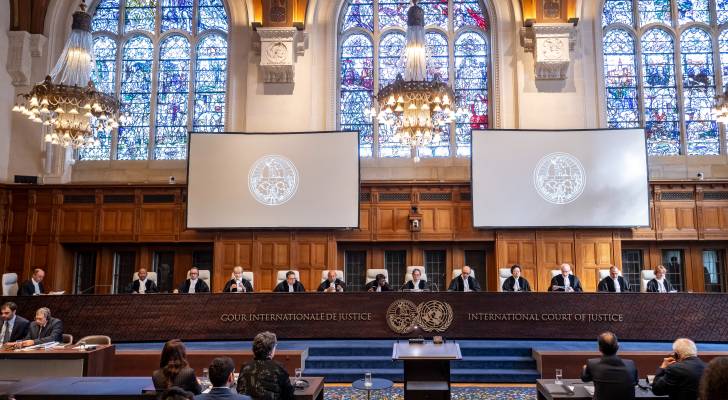International Court of Justice
Jordan condemns 'Israel's' illegal actions in occupied Palestine at ICJ
In a compelling presentation before the International Court of Justice (ICJ), the Hashemite Kingdom of Jordan, represented by Professor Marcello Cohen, delivered argument condemning 'Israel’s' policies and practices in the Occupied Palestinian Territory, including Gaza.
Jordan asserted that 'Israel’s' actions demonstrate a blatant disregard for international law, violate fundamental human rights, and obstruct the Palestinian people’s inalienable right to self-determination.
Jordan’s unique stake in the Palestinian cause
Jordan’s delegation emphasized the kingdom’s deep connection to the Palestinian struggle, with the Kingdom hosting over 2.4 million Palestinian refugees registered with the United Nations Relief and Works Agency (UNRWA).
As the custodian of Muslim and Christian holy sites in Jerusalem, the kingdom plays a historic role in preserving the religious and cultural heritage of the region.
Jordan’s tireless efforts to provide humanitarian assistance to Palestinians in the Occupied Palestinian Territory and its commitment to fostering peace in the Middle East underscore its authority to address the ICJ on this matter.
Deteriorating crisis: Ceasefire collapse, humanitarian blockade
Professor Cohen highlighted the catastrophic consequences of the breakdown of the ceasefire in Gaza, which has exacerbated an already dire situation. Since March 2025, 'Israel’s' ban on humanitarian assistance to Gaza has blocked all aid, leaving 2.1 million residents without access to food, water, or medical supplies.
This blockade, coupled with intensified 'Israeli' actions in the West Bank, including settlement expansion and land confiscation, has deepened the humanitarian crisis and entrenched Israel’s illegal occupation.
Jordan argued that 'Israel’s' actions not only violate international humanitarian law but also contravene its obligations under international human rights law, including the International Covenant on Civil and Political Rights (ICCPR) and the International Covenant on Economic, Social and Cultural Rights (ICESCR).
Quoting common Article 1 of these covenants, Cohen stated, “No people may be deprived of its own means of subsistence,” underscoring 'Israel’s' duty to respect the Palestinian people’s right to self-determination and access to basic resources.
'Israel’s' obligations under international law
The Jordanian delegation clarified that the ICJ’s advisory opinion, requested by the UN General Assembly in December 2024, focuses on 'Israel’s' obligations as the occupying power in the Occupied Palestinian Territory. Unlike South Africa’s 2024 genocide case against 'Israel', this proceeding addresses 'Israel’s' broader responsibilities in a general context, emphasizing its unique role as the sole occupier of Palestinian territory.
Jordan asserted that 'Israel' is legally bound to:
Ensure the safety of UN personnel and facilities: 'Israel' must protect the 5.9 million Palestinian refugees reliant on UNRWA’s services, including education, healthcare, and food aid. The recent deaths of 295 UN personnel in Gaza since October 2023 and attacks on 830 UNRWA premises highlight 'Israel’s' failure to uphold these obligations.
Facilitate UN operations: 'Israel’s' October 2024 ban on UNRWA operations, including the confiscation of its East Jerusalem headquarters for illegal settlement construction, violates the 1946 Convention on the Privileges and Immunities of the United Nations.
End its illegal presence: 'Israel' must cooperate with the UN and other international organizations to terminate its occupation swiftly, enabling Palestinians to exercise their right to self-determination.
In closing, Professor Cohen reiterated Jordan’s unwavering commitment to peace and justice. “Israel’s actions in the Occupied Palestinian Territory are a direct affront to the principles of international law and human dignity,” he declared. “The Hashemite Kingdom of Jordan urges the ICJ to affirm that 'Israel' must end its illegal occupation, respect the rights of the Palestinian people, and cooperate with the United Nations to secure a just and lasting peace.”
Jordan’s second, third delegation
Complementing Professor Kohen’s arguments, Jordan’s second delegation, led by Professor Eirik Bjorge of Bristol University Law School, focused on 'Israel’s specific' obligations to protect UN personnel and UNRWA under the 1994 Convention on the Safety of United Nations and Associated Personnel.
Bjorge declared, “Israel must uphold UNRWA’s immunity and respect UN operations in Palestine,” condemning Israel’s attacks on 830 UNRWA facilities and the killing of 290 staff since October 2023.
He argued that 'Israel’s' October 2024 ban on UNRWA seeks to “extirpate” the agency, violating the UN Charter.
Jordan’s third delegation, led by Professor Alfredo Crosato, further emphasized 'Israel’s' unfulfilled obligations as an occupying power in Gaza, particularly regarding humanitarian relief.
Crosato asserted, “Israel has not been liberated from its obligations as an occupying power in Gaza and has engaged in a sustained abuse of its position.” He highlighted 'Israel’s' March 2025 blockade, which has starved civilians and blocked all aid, as a violation of the Fourth Geneva Convention’s requirement to ensure humanitarian needs.
Crosato argued that 'Israel’s' actions forfeit its claim to any broad rights under the law of occupation, urging the ICJ to hold 'Israel' accountable for exacerbating Gaza’s humanitarian crisis.
Urgency of the ICJ’s advisory opinion
Jordan stressed the critical importance and urgency of the ICJ’s advisory jurisdiction in this case. The court’s opinion, expected by late May or early June 2025, will clarify 'Israel’s' obligations under the UN Charter, international humanitarian law, and human rights law. It will also build on prior ICJ rulings, including the 2004 advisory opinion on the illegality of 'Israel’s' separation wall and the 2024 opinion declaring 'Israel’s' occupation unlawful. These rulings have consistently affirmed the Palestinian people’s right to self-determination and condemned 'Israel’s' policies of annexation, settlement expansion, and racial discrimination.
The delegation argued that the ICJ’s guidance is essential to address the international community’s failure to hold 'Israel' accountable. The ongoing blockade of Gaza, escalating violence in the West Bank, and threats to holy sites in Jerusalem demand immediate action. Jordan’s representative underscored that the advisory opinion will serve as a beacon for restoring respect for international law and ensuring justice for Palestinians.
As the ICJ hearings continue, Jordan’s argument stands as a powerful testament to the urgent need for accountability and the restoration of Palestinian self-determination.




